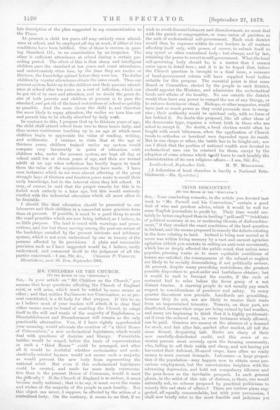MR. CH]ILDERS ON THE CHURCH.
tTo Tits EDITOR OF THE SPECTATOR.") SIR,—In your article on "Mit. Childers on the Church," you assume that large questions affecting the Church of England exist, or will arise, which must be settled by some means or other ; and that neither Parliament nor Convocation, as at pre- sent constituted, is a fit body for that purpose. If this be so, as I believe most of your readers will admit, it is clear that either means must be found of enabling .the Church to adapt itself to the will and wants of the majority of Englishmen, or Disestablishment and Disendowment will remain as the only practicable alternative. You, if I have rightly apprehended your meaning, would .advocate the creation of "a third Home of Convocation," a new ecclesiastical legislature, which would deal with questions of doctrine and liturgy. Formidable battles would be waged, before the basis of representation in such a "third House" could be arranged, and after all it would be doubtful whether ecclesiastics and eccle- siastically-minded laymen would not secure such a majority as would prevent the new body from representing the national mind. But even if this ecclesiastical legislature could be created, and made far more truly representa- tive than is the present House of Commons, would it meet the,flifficulty If the Church of England is to endure, it must become really national ; that is to say, it must serve the wants and wishes of the majority of the people in each locality. But this object can never, I suppose, be effected by the action of a neutralised body. On the contrary, it seems to me that, if we
wish to avoid disestablishmeut and disendowment, we must deal with the parish or congregation, or some union of parishes, as the unit of ecclesiastical self-government. Each such district would then be supreme within its own borders in all matters affecting itself only, with power, of course, to submit itself to any synod or other centralised body ; but always, and by law, retaining the power to revert to self-government. What the local self-governing body should be, is a matter that I. cannot enter upon in detail here ; and it is to be hoped that, before the Church question is brought to a final issue, a measure of local-government reform will have supplied local bodies suitable for this purpose. The essential point is that some Board or Committee, elected by the people in each district, should appoint the Minister, and administer the ecclesiastical funds and affairs of the locality. No one outside the district would then have any power to compel the use of any liturgy, or to enforce doctrine or ritual. Bishops, or other magnates, would have just so much power as they could persuade men to recog- nise; their authority would be spiritual only, with no force of law behind it. No doubt this proposal, like all other ideas of the democratic type, requires a robust faith in those who are asked to accept it. No doubt, a local election would often be fought with much bitterness, when the application of Church funds to orthodox or heretical uses depended upon its result. But in one shape or other, the battle has to be fought out; nor can I think that the portion of national wealth now devoted to. ecclesiastical uses can be retained for them, except by the adoption of some scheme which would leave to each locality tho administration of its own religious affairs.—I am, Sir, Sm.,
Leatherhead, September 15th. M. W. MOGGRIDGE. [A federation of local churches is hardly a National Esta- blishment.—En. Spectator.]


































 Previous page
Previous page